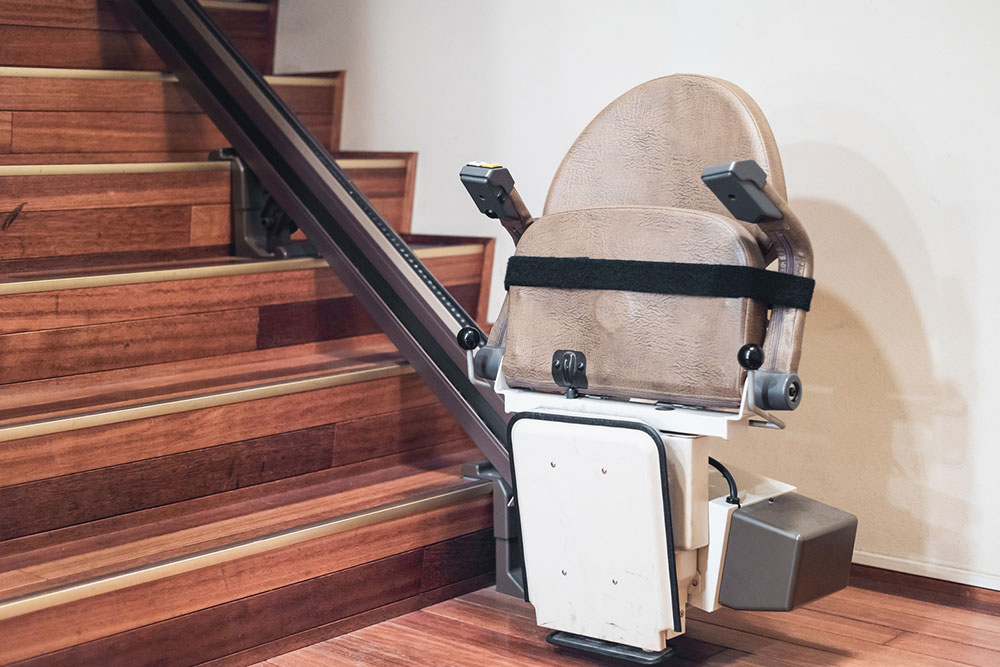Stairlifts – Types, Uses, and Costs
Stairlifts are a great way to make homes safer and more accessible for anyone with mobility issues, especially for seniors who live alone or with family and need to access the upper floor without assistance. There are various types of stairlifts that come with different features for the user. Knowing the benefits, cost, installation procedure, and warranties is essential in making a purchase decision about such a product that has specific uses.
What is a stairlift?
This is an accessibility equipment designed to help those with mobility limitations. The components of a stairlift include a chair, a motor, and a fixed track.

How does a stairlift work?
Electric stairlifts have battery-powered rack-and-pinion drive systems. They are charged by a nearby outlet attached either at the top or the bottom of the stairs. Safety features like the speed governor and emergency braking system make them easy to use. This kind of stairlift travels at 18 feet per minute.
The power supplied by the electrical outlet helps maintain the battery charge, which allows the chair to go up and down the different levels.
The battery life for these stairlifts is 1 to 5 years, which often depends on how much the device is used. Whenever one thinks it is time to replace the battery, one can ask the manufacturer to send a professional who will monitor the situation and suggest a replacement.
Types of stairlifts
There are three basic types of stairlifts: straight, curved, and outdoor. Each is designed to suit the different structures of the staircase, and each has unique features.
Straight stairlifts
This is the most common type of stairlift, and it is designed to suit straight-run staircases, which are very simple. These stairs are usually 12 to 16 steps; however, depending on the house and the structure, there could be more or fewer stairs. This stairlift can be installed on a staircase that is 12 meters long, so there’s enough buffer space. Most staircases at home are much shorter, so this is a good distance to maintain.
Curved stairlifts
Staircases with curves or turns are a bit more complicated to install than stairlifts that can be installed on a straight staircase. This is why curved stairlifts are specially designed to cater to these staircase designs. Within the curved stairlifts, there are two popular designs, including the custom curved stairlift, which is made after a home survey and customized according to the needs of the customer.
The other is a modular stairlift which is made from an existing set of rail sections. When these rail sections are already in stock, the modular stairlift can easily be installed. The ride might be a bit bumpy, but it is safe.
Outdoor stairlifts
As the name suggests, these stairlifts are designed for outdoor staircases. They are installed to access areas like the garden, backyard, and garage. Outdoor stairlifts are designed to withstand weather conditions and harsh climates like the heat and the cold. They are made of durable metal rails, and the seats are made of plastic, which is weather-proof. There is also a protective cover and a closed rail system, which protects and makes it safe to use.
The stairlifts are mobile and portable, making them easy to transport and store. The equipment can fold down to a fraction of its operational size and can easily be fit into any car trunk. So, if one is moving homes, they can be removed and installed in the new space.
Cost
The costs of stairlifts vary widely, and this depends on the kind of stairlift being used and any specific device being purchased. Other factors affecting the cost include labor costs, upgrades used, permits, taxes, age of the stairlift, condition of the stairlift, and the stairlift design. Here is some average pricing for the stairlifts:
The straight type can cost between $2,200 and $8,500
The curved type can cost $10,500 to $27,000
Outdoor stairlifts can cost $5,000 to $30,000
Used stairlifts can cost $2,000 to $3,000
These are expensive equipment, and there are ways to save money on this expenditure. One can claim a tax deduction by asking the doctor to write a recommendation. An individual could also apply for some grants funded by the federal and state governments and check for healthcare benefits in the health insurance policy that one has enrolled in.
